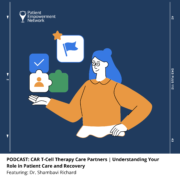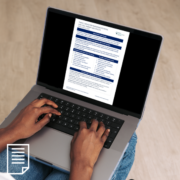Are You a CAR T-Cell Therapy Care Partner? Why You Should Ask for Help
Are You a CAR T-Cell Therapy Care Partner? Why You Should Ask for Help from Patient Empowerment Network on Vimeo.
Asking for help as a CAR T-cell therapy care partner does not show weakness. Social worker Marc Paloma shares why it’s important to ask for support and resources. Marc Paloma is an outpatient hematology/oncology clinic social worker at University of Chicago Medicine.
See More from The Care Partner Toolkit: CAR T-Cell Therapy
Related Resources:
Transcript:
Katherine Banwell:
Why is it so important for care partners in asking for help?
Marc Paloma:
I think it always keeps getting back to what I had said previously was that it’s important for care partners to acknowledge that they are also going through a parallel process. Obviously, it’s not the same process because the medical intervention isn’t happening to the care partner, that’s happening to the patient obviously. But there’s also a process that the care partner is going through. So, of course, the main focus of all the treatment and the follow-up visits, a lot of it, of course, is focused on the patients. Them getting blood draws and results and how are things going and looking for signs of infection and all of those things.
So, there’s so much focus on the patient that I always want to make sure that the care partner knows that they’re not being lost in the shuffle. That there’re also somebody who’s kind of thinking about them or at least acknowledging that, “Yes, I’m going through this process as well.”
And that is something that can be very stressful. It can be very taxing physically; it can be very taxing mentally. And I feel like just knowing that a care partner somebody is there to tell a care partner that like, “Yes, I acknowledge that you’re going through this and that this is happening.” I think it just helps a care partner sometimes feel that they are being supported or that they’re being heard. Because I feel that sometimes care partners feel that it’s they’re the unsung heroes doing the heavy lifting of doing the caretaking for the patient.
And, yes, it’s not about the care provider doing it so that they can get the glory of being the care partner. But it is sometimes nice for somebody to say to them, “What you’re doing is a really hard thing. And it’s obviously very important, and the patient relies on you, and our care team here at the University of Chicago relies on you.”
“So, what you’re doing is important, but it can also be sometimes difficult physically and also even mentally.”
Katherine Banwell:
Yeah.
Marc Paloma:
So, it’s just good to I feel like good to give that encouragement to the care provider.













